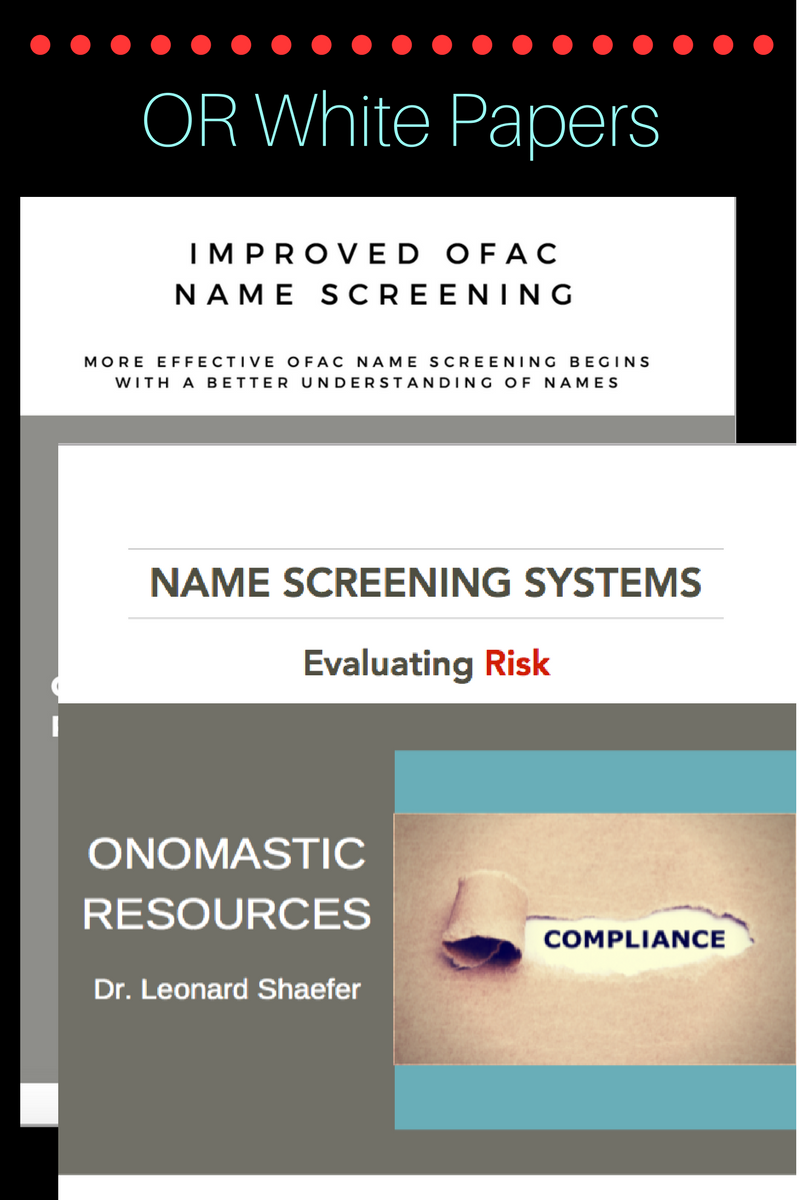Onomastic Resources solves a wide variety of name screening and processing problems, quickly and cost-efficiently. We can help resolve tuning and accuracy issues, ensure that you make sound make/buy decisions, and work with your existing staff to build an organizational culture that exploits your name data to best effect. Our mission is to help organizations ensure that resources they allocate to name processing are proportional to risk and sufficient to the task.
With over 25 years experience solving names problems for governments and corporations around the world and multiple patents in automated processing techniques for large collections of multi-cultural names, Onomastic Resources is uniquely qualified to help you solve the names problem.
Engagements usually include one or more of the consultative services listed below, but if you don’t see what you are looking for here, please contact us to discuss customized solutions.
Named Entities (NE) Processing Audit: Focus on risk/vulnerability identification/mitigation, competitive advantage opportunities and program for continuous improvement. An audit typically includes at least the following task-areas:
- Review all enterprise processes where names are crucial/unique for successful outcomes
- For each identified name-centric process, analyze, document and report on all three interdependent aspects of NE processing:
- Data: size, type and distribution of NE collections; consistency and compatibility of data models used with NEs
- Algorithms/processing resources: suitability of search/match techniques for the types of NEs and their associated ethnic/linguistic backgrounds
- Users: identify actors who consume and/or interpret the results generated by name-centric processes; align training and reference resources with user skills; locate mechanisms for improved skills transfer from experiences users to novices
Product Evaluations/Project Support: Make-vs-buy decisions, multi-product fly-offs, requirements definitions and RFP/RFQ support: all these activities will generally contain a component that can necessitate special metrics uniquely suited to NEs. OR can provide the specialized perspectives ensuring that critical name-processing features are addressed adequately by any and all candidates.
App/architecture reviews; system and process tuning: Reviews of installed based of commercial product(s) and/or in-house app(s), which typically include:
- Optimization of precision/recall/F-measure metrics, for a specific set of operational circumstances (e.g., transactions per unit of time, target response time per transaction)
- Accrual/documentation/distribution of institutional wisdom on NE handling
- Assessment of potential impacts from M&A and/or large-scale ETL activities, to understand how existing NE-related processes might be affected
NE data analytics/curation/enrichment: Know Your Data = Know Your Customer + Big Data. When considered individually, names may not always display the characteristics that must be addressed effectively in key name-centric processes. Personal names, in particular, have distributional properties that generally grow in stability proportional to the size of the collection in which they occur. Similarly, distribution of many categories of errors that can hamper or defeat downstream name-related processing often becomes more predictable as collection size increases. In-depth assessments can be directed towards names of any provenance, including:
- Internal/owned/locally generated NE data
- External/imported data (e.g., SDN/OFAC list)
User/decision-maker training: While many large multinational corporations and agencies may possess considerable pools of the special linguistic and cultural knowledge that can provide a boost to the value of name-centric processes, these resources are not always mapped optimally to the parts of the processing flow where they can make the biggest difference. In addition, the specific skills that distinguish the very best users are all too often left undocumented, turning strength into risk as these users are promoted, transferred or hired away. A concise, data-driven training program can yield measurable improvements in name-processing outcomes, and need not involve onerous, extensive indoctrination.



